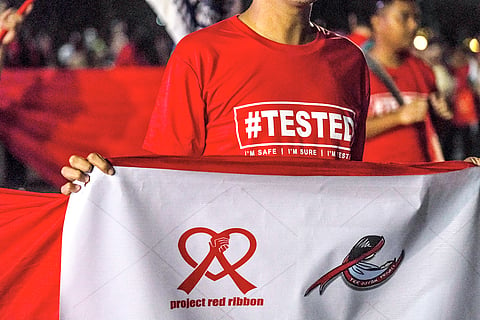
- NEWS
- the EDIT
- COMMENTARY
- BUSINESS
- LIFE
- SHOW
- ACTION
- GLOBAL GOALS
- SNAPS
- DYARYO TIRADA
- MORE

PUERTO PRINCESA CITY, Palawan — Health authorities in Palawan are raising concerns over the increasing number of HIV cases among minors, with a 13-year-old now identified as the youngest patient to contract the virus through unprotected contact.
STI, HIV, and AIDS Program Coordinator Regina Villapa of the Puerto Princesa City Health Office (CHO) reported in a press briefing yesterday that 17 individuals aged 0-14 have tested positive for HIV in the province as of 18 March.
The 13-year-old contracted the virus via unprotected sexual activity, while the youngest case included a newborn infected through mother-to-child transmission.
With 391 infections, CHO data indicates that the age group of 15 to 24 accounts for the largest number of cases. Meanwhile, there have been 593 instances reported in the 25–34 age range, 187 in the 35–49 age range, and 22 in the 50+ age range.
The Mimaropa region has 2,261 confirmed HIV cases, which accounts for 3% of the national total. Palawan has 1,198 reported cases, with Puerto Princesa City accounting for 709 of them, making it one of the province's most afflicted localities.
Villapa said efforts to raise awareness and offer tests have contributed to the uptick in cases, but she warned that the virus is still spreading, particularly among the youth.
"Aside from the increasing number of cases, what is worrying is that the age of those getting infected keeps getting younger. Under our revised policy, individuals aged 15 and above can get tested without parental consent. We have seen that some 15-year-olds who voluntarily got tested turned out reactive (HIV-positive)," Villapa said.
HIV infections in Palawan have been rising consistently since the first case was recorded in 2001. According to national statistics, the average number of new cases per day in the Philippines has already reached 48, which is a significant concern for health experts.
In light of the growing crisis, the CHO and the Amos Tara Community Center are ramping up initiatives to promote HIV testing and timely treatment. Both institutions provide complimentary and private HIV screening, counseling, and treatment services, which encompass Pre-Exposure Prophylaxis (PrEP) aimed at preventing infection in high-risk individuals.
Amos Tara additionally endorses community-based screening initiatives, allowing individuals to access testing in barangays or utilize self-testing kits; these initiatives play a crucial role in the local HIV response.
To further remove barriers to treatment, the City Health Office arranges for testing to take place in places of employment and educational institutions.
"Our goal is to support the city government and Puerto Princesa in HIV testing and our initiatives for the community. Our main objective is to work together to ensure that there are no new HIV cases in Puerto Princesa and Palawan," said Maria Charisma Deriada of the Amos Tara Community Center.
"We also want to reach people who do not yet know their HIV status and help them start treatment. This way, we can further reduce stigma and discrimination against those affected in the community," she added.
Only 63% of persons living with HIV in the country are aware of their status, and 46% of them are receiving treatment for their condition. The government aims to attain the worldwide 95-95-95 objective, which states that 95% of persons living with HIV are aware of their status, 95% get treatment, and 95% achieve viral suppression.
Villapa pointed out that the stigma attached to being tested is still one of the biggest obstacles to HIV prevention.
Despite legislative safeguards under Republic Act 11166, which guarantees anonymity for persons seeking HIV-related care, many people avoid screening out of fear of being judged.
"People hesitate to get tested because of what others might say. That’s why many sacrifice their health. There are even communities where they make a pact that no one will get tested. These are the mindsets we are trying to change," she said.
